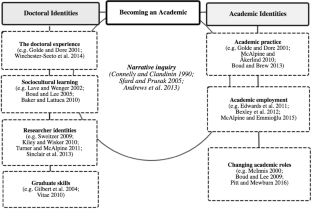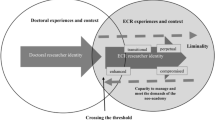Abstract
It is commonly believed that the doctorate prepares students for academic careers. While there is wide ranging literature about the development of doctoral students as researchers, preparation for the other aspects of academic careers, e.g. teaching, is mostly absent from the discussion. This qualitative longitudinal study investigated the shift from doctoral identities to academic identities using narrative inquiry. It examined the narratives of 15 doctoral students from two large Australian universities, who were approaching thesis submission and who aspired to academic employment. Two contrasting stories illuminated in-depth accounts of how academic identities were developed and experienced. Students defined their identities and assessed their academic development in relation to their perceived ‘market value’ in academia. To increase their employability, they engaged in university teaching and focused on strategic networking. Students regarded researcher development as the main focus of the doctorate as being insufficient for an academic career. This paper argues that doctoral education needs to facilitate student agency, encourage synergies between teaching and research, and support non-academic work experiences to strengthen researcher identity development.

Similar content being viewed by others
References
Andrews, M., Squire, C., & Tamboukou, M. (2013). Doing narrative research. London: Sage.
Baker, V. L., & Lattuca, L. R. (2010). Developmental networks and learning: Toward an interdisciplinary perspective on identity development during doctoral study. Studies in Higher Education,35(7), 807–827.
Barnacle, R., & Mewburn, I. (2010). Learning networks and the journey of “becoming doctor”. Studies in Higher Education,35(4), 433–444.
Bexley, E., Arkoudis, S., & James, R. (2012). The motivations, values and future plans of Australian academics. Higher Education,65(3), 385–400.
Boud, D., & Brew, A. (2013). Reconceptualising academic work as professional practice: Implications for academic development. International Journal for Academic Development,18(3), 208–221.
Boud, D., & Lee, A. (2005). “Peer learning” as pedagogic discourse for research education. Studies in Higher Education,30(5), 501–516.
Braun, V., & Clarke, V. (2006). Using thematic analysis in psychology. Qualitative Research in Psychology,3(2), 77–101.
Brew, A., Boud, D., & Un Namgung, S. (2011). Influences on the formation of academics: The role of the doctorate and structured development opportunities. Studies in Continuing Education,33(1), 51–66.
Clance, P. R., & Imes, S. A. (1978). The imposter phenomenon in high achieving women: Dynamics and therapeutic intervention. Psychotherapy: Theory, Research and Practice,15(3), 241–247.
Clegg, S. (2008). Academic identities under threat? British Educational Research Journal,34(3), 329–345.
Connelly, F. M., & Clandinin, D. J. (1990). Stories of experience and narrative inquiry. Educational Researcher,19(5), 2–14.
Edwards, D., Bexley, E., & Richardson, S. (2011). Regenerating the academic workforce: The careers, intentions and motivations of higher degree research students in Australia: Findings of the National Research Student Survey (NRSS). Higher Education Research.
Gardner, S. K. (2008). Fitting the mold of graduate school: A qualitative study of socialization in doctoral education. Innovative Higher Education,33(2), 125–138.
Gilbert, R., Balatti, J., Turner, P., & Whitehouse, H. (2004). The generic skills debate in research higher degrees. Higher Education Research & Development,23(3), 375–388.
Golde, C. M., & Dore, T. M. (2001). At cross purposes: What the experiences of today’s doctoral students reveal about doctoral education. Philadelphia: Pew Charitable Trusts.
Greer, D. A., Cathcart, A., & Neale, L. (2016). Helping doctoral students teach: Transitioning to early career academia through cognitive apprenticeship. Higher Education Research & Development,35(4), 712–726.
Grover, V. (2006). How am I doing? Checklist for doctoral students at various stages of their program. Decision Line,37(2), 24–27.
Hodkinson, P., & Sparkes, A. C. (1997). Careership: A sociological theory of career decision making. British Journal of Sociology of Education,18(1), 29–44.
Huang, C. (2012). Gender differences in academic self-efficacy: A meta-analysis. European Journal of Psychology of Education,28(1), 1–35.
Jepsen, D. M., Varhegyi, M. M., & Edwards, D. (2012). Academics’ attitudes towards PhD students’ teaching: Preparing research higher degree students for an academic career. Journal of Higher Education Policy and Management,34(6), 629–645.
Kiley, M., & Wisker, G. (2010). Learning to be a researcher: The concepts and crossings. Threshold Concepts and Transformational Learning. Rotterdam: Sense Publishers.
Lave, J., & Wenger, E. (2002). Legitimate peripheral participation’ in Communities of Practice. In R. Harrison (Ed.), Supporting lifelong learning: Volume 1—Perspectives on learning (pp. 111–126). London & New York: Routledge Falmer.
Mantai, L. (2017). Feeling like a researcher: experiences of early doctoral students in Australia. Studies in Higher Education, 42(4), 636–650.
Markus, H., & Nurius, P. (1986). Possible selves. American Psychologist,41(9), 954.
McAlpine, L. (2012). Identity-trajectories: Doctoral journeys from past to present to future. Australian Universities’ Review,54(1), 38–46.
McAlpine, L., & Åkerlind, G. (2010). Becoming an academic. Palgrave Macmillan. Retrieved from https://books.google.com.au/books?hl=de&lr=&id=9ZhiAQAAQBAJ&oi=fnd&pg=PP1&dq=becoming+an+academic&ots=T0gQ_WCoGe&sig=npzj91ewUqcgn6WKH8cg202Db5E.
McAlpine, L., Amundsen, C., & Turner, G. (2014). Identity-trajectory: Reframing early career academic experience. British Educational Research Journal,40(6), 952–969.
McAlpine, L., & Emmioğlu, E. (2015). Navigating careers: Perceptions of sciences doctoral students, post-PhD researchers and pre-tenure academics. Studies in Higher Education,40(10), 1770–1785.
McAlpine, L., Jazvac-Martek, M., & Hopwood, N. (2009). Doctoral student experience in education: Activities and difficulties influencing identity development. International Journal for Researcher Development,1(1), 97–109.
McCormack, C. (2004). Storying stories: a narrative approach to in-depth interview conversations. International Journal of Social Research Methodology,7(3), 219–236.
McInnis, C. (2000). Changing academic work roles: The everyday realities challenging quality in teaching. Quality in Higher Education,6(2), 143–152.
National Union of Students. (2013). Postgraduates Who teach. Retrieved from https://www.nus.org.uk/PageFiles/12238/1654-NUS_PostgradTeachingSurvey_v3.pdf.
Oyserman, D., Bybee, D., & Terry, K. (2006). Possible selves and academic outcomes: How and when possible selves impel action. Journal of Personality and Social Psychology,91(1), 188.
Oyserman, D., & Fryberg, S. (2006). The possible selves of diverse adolescents: Content and function across gender, race and national origin. Possible selves: Theory, research, and applications,2(4), 17–39.
Pearson, M., & Brew, A. (2002). Research training and supervision development. Studies in Higher Education,27(2), 135–150.
Peterson, E. B. (2014). Re-signifying subjectivity? A narrative exploration of ‘non-traditional’ doctoral students’ lived experience of subject formation through two Australian cases. Studies in Higher Education,39(5), 823–834.
Pitt, R., & Mewburn, I. (2016). Academic superheroes? A critical analysis of academic job descriptions. Journal of Higher Education Policy and Management,38(1), 88–101.
Rond, M. D., & Miller, A. N. (2005). Publish or perish bane or boon of academic life? Journal of Management Inquiry,14(4), 321–329.
Saldaña, J. (2015). The coding manual for qualitative researchers. Thousand Oaks: Sage.
Sfard, A., & Prusak, A. (2005). Telling identities: In search of an analytic tool for investigating learning as a culturally shaped activity. Educational Researcher,34(4), 14–22.
Sinclair, J., Barnacle, R., & Cuthbert, D. (2013). How the doctorate contributes to the formation of active researchers: What the research tells us. Studies in Higher Education,39(10), 1972–1986.
Sweitzer, V. B. (2009). Towards a theory of doctoral student professional identity development: A developmental networks approach. The Journal of Higher Education,80(1), 1–33.
Thiry, H., Laursen, S. L., & Loshbaugh, H. G. (2015). “How do i get from here to there?” An examination of Ph. D. science students’ career preparation and decision making. International Journal of Doctoral Studies,10(1), 237–256.
Turner, G., & McAlpine, L. (2011). Doctoral experience as researcher preparation: Activities, passion, status. International Journal for Researcher Development,2(1), 46–60.
Vitae. (2010). Vitae Researcher Development Statement (RDS), Careers Research and Advisory Centre (CRAC) Limited.
Walker, G. E., Golde, C. M., Jones, L., Bueschel, A. C., & Hutchings, P. (2009). The formation of scholars: Rethinking doctoral education for the twenty-first century. New York: Wiley.
Willison, J., & O’Regan, K. (2013). Researcher skill development framework. Retrieved from https://www.adelaide.edu.au/rsd/.
Winchester-Seeto, T., Homewood, J., Thogersen, J., Jacenyik-Trawoger, C., Manathunga, C., Reid, A., et al. (2014). Doctoral supervision in a cross-cultural context: Issues affecting supervisors and candidates. Higher Education Research and Development,33(3), 610–626.
Acknowledgements
This work was supported by Macquarie University Research Excellence Scholarship. My supervisors Dr Agnes Bosanquet, Prof Robyn Dowling and Dr Theresa Winchester-Seeto deserve special thanks. Agnes, in particular, provided generous feedback on the earlier drafts. I am also grateful to my research participants and the anonymous reviewers who provided valuable comments in the writing process.
Author information
Authors and Affiliations
Corresponding author
Rights and permissions
About this article
Cite this article
Mantai, L. “Feeling more academic now”: Doctoral stories of becoming an academic. Aust. Educ. Res. 46, 137–153 (2019). https://doi.org/10.1007/s13384-018-0283-x
Received:
Accepted:
Published:
Issue Date:
DOI: https://doi.org/10.1007/s13384-018-0283-x




